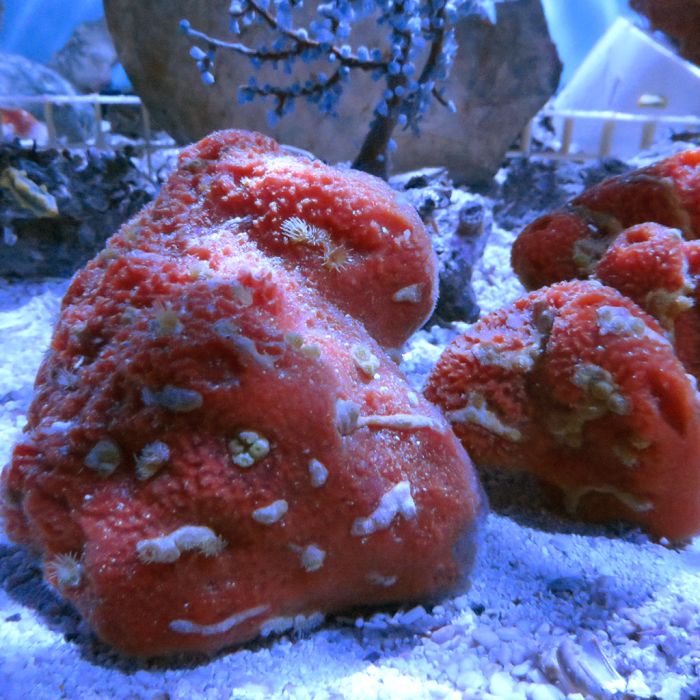Gold Speckled Sponge
This impressive Caribbean sponge is typically a deep orange color marbled with yellow zoanthids. Together they create a spectacular showpiece displaying a fascinating commensal arrangement. Their contrasting colors act as a warning to predators- one or both animals may be quite toxic. They can also provide each other with food.
The needs of both the filter-feeding sponge and its photosynthetic partner zoanthid must be met to ensure success. The sponge receives its energy by capturing fine phyto and zooplankton, coral snow and small edible particles which may be found in mature aquariums. Occasionally stirring the sand may release some food items which the sponge may capture- most food utilized is 0.1-1.5 micrometers (typically 0.5 μm or smaller). We recommend this animal only for expert aquarists who can provide the care it demands.
Moderate to strong water flow is essential over all parts of the sponge. Lateral flow should be used, and never wave or surge action, or point-source powerheads, which may damage the animal’s delicate structure. Water flow will deliver food to the sponge and remove wastes, and also help to clear nuisance algae, cyanobacteria and debris. Lower lighting or shade should be used to discourage algae overgrowth- for some species bright light is actually damaging. Sponge should never be exposed to air, as it will become trapped within the animal and cause starvation and necrosis. It should be transferred while underwater. If damage from trapped gasses affects the animal the damaged area should be cut away. Poor water quality is also not tolerated by sponges. It should be inspected for predatory nudibranch which are found on some colonies.
Most sponges contain toxins which may damage other sessile animals if touched, or be released into the water if the sponge is dead or dying. Demosponges such as this are comprised of silica spicules which may be extremely irritating if touched. As well, most species of zoanthid also contain toxins in their mucus and tissues, including the potent neurotoxin palytoxin, which may be dangerous to humans. It is important not to underestimate the potency of this toxin- gloves are highly recommended when handling this animal.
Sponges make excellent tank-mates with other filter-feeding creatures such as sun, flowerpot, carnation and chili corals, gorgonians, tunicates, clams and oysters which would also benefit from added food.
- Difficulty: Advanced
- Growth Speed: Slow
- Lighting: Medium
- Average Placement: Middle
- Water Flow: Medium - High
- Temperament: Peaceful

